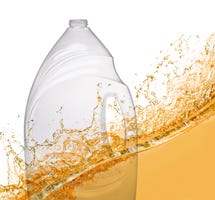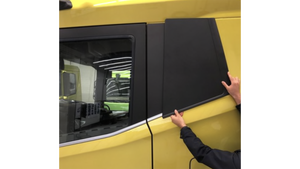By avoiding melt fracturing, a new line of copolyesters is well suited for high-output extrusion blowmolding (EBM) technologies, including wheel and reciprocating screw systems, opening up opportunities in the juice, dairy, and distilled spirits markets, among others.
September 27, 2010
By avoiding melt fracturing, a new line of copolyesters is well suited for high-output extrusion blowmolding (EBM) technologies, including wheel and reciprocating screw systems, opening up opportunities in the juice, dairy, and distilled spirits markets, among others. Launched at InterBev 2010 in Orlando, Aspira copolyester EN177 from Eastman Chemical Co. (Kingsport, TN) will join the company's Eastar copolyester EB062 (now Aspira EB062), which was introduced to the market in 2004 as a copolyester for EBM processes.
Sam Glover, Eastman's market development manager for food, beverage, and consumer packaging, told PlasticsToday that in
Eastman's Aspira copolyester
markets where many OEMs opt for stock-shape bottles, the ability to mold in through handles, as well as the clarity and toughness of copolyester, could help a product stand out on the shelf."What we wanted to do was to establish a brand that would fit within the food, beverage, and consumer packaging market space,' Glover said, "a brand that would represent what our value proposition is within that space, which is clarity, gloss, design freedom, and really the ultimate overall idea is inspiring the market place, both at the point of purchase and also inspiring brands to be innovative around their packaging and that's where the Aspira [pronounced as-SPY-rah] name came from.
Eastman says the material allows designers to create containers with functional handles and volumes of 60 ounces and larger utilizing all EBM platforms-shuttle, wheel, and reciprocating screw-at industry-standard speeds, to boost production efficiency for high-output applications. Eastman notes that it's the high melt strength of the material that allows manufacturing of large-volume containers, adding that the new copolyester is more compatible with the PET post-consumer recycling stream than previous generations of copolyesters.
Glover said that with the wheel platform, in particular, the new Aspira line will allow Eastman to go after much larger applications, where a customer may have been using a wheel because of the high annual volume, noting those are quite often juice applications. By not melt fracturing, which can lead to haze, Aspira is also suited for reciprocating screw machines, which dominate dairy, opening up a slew of potential products.
Also of interest is the distilled spirits market where two-stage injection stretch blowmolded polyethylene terephthalate (PET) is often utilized, requiring brands to use pinch grips or add-on handles where Aspira could have a handle molded in. "You could also do integrated handles instead of pinch grips," Glover said. "Just overall bring a higher quality of design and shelf appeal in plastics to the distilled spirits market."
About the Author(s)
You May Also Like


